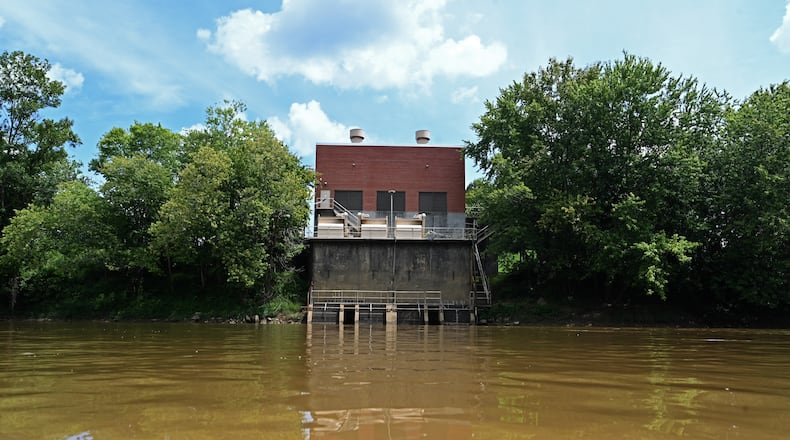As northwest Georgia’s carpet manufacturing industry faces a barrage of potentially costly lawsuits, a new proposal introduced in the state legislature would grant broad immunity to carpet companies and municipalities accused of tainting the public water supply with the toxic “forever chemicals” known as PFAS.
House Bill 211, introduced recently by several northwest Georgia Republicans, comes as the area’s carpet industry faces at least half a dozen lawsuits accusing them of contaminating local drinking water with PFAS — compounds connected to a host of negative health effects, including fertility problems and certain cancers.
Last year, the EPA set its first limits on PFAS levels in drinking water.
The battle over PFAS contamination in Georgia has primarily centered on the state’s northwest corridor, including Dalton, which is known as the “carpet capital of the world.” For years, flooring companies purchased PFAS-laden Stainmaster and Scotchgard products from chemical manufacturers to add stain and water resistance to their own products. Wastewater from these plants then was discharged into nearby waterways or sprayed on land, according to complainants in court filings.
The name “forever chemicals” is a nod to the molecules’ strong bonds, which makes them resistant to breakdown in nature and allows them to accumulate in soil, water and even the human body.
The legislation would classify the carpet manufacturers, municipalities and others as so-called “PFAS receivers” and shield them from liability. The bill would not protect chemical manufacturers and therefore not shut the door on future lawsuits against companies that manufactured the chemicals, such as 3M and DuPont.
It is unclear whether the new law would affect current litigation or only apply to future lawsuits.
State Rep. Kasey Carpenter, R-Dalton — one of the five Northwest Georgia Republican lawmakers sponsoring the bill — said carpet manufacturers were unaware that PFAS chemicals were dangerous, and liability ultimately falls on the chemical’s manufacturers.
“At the end of the day, we’re sick and tired of lawsuits being brought against everybody when the chemical was made by a company and was professed to be safe by a company.” Carpenter said.
He said the bill does not protect PFAS receivers from Environmental Protection Agency and Georgia Environmental Protection Division actions.
Last year, Georgia-based Mohawk Carpet sued 3M, DuPont and others for fraud, alleging the chemical manufacturers concealed the risks of PFAS in their products.
Critics say that, as the battle to address PFAS contamination intensifies, the bill is a step in the wrong direction.
“Rather than letting industrial sources of PFAS pollution off the hook for harm to people and the environment through this bill, the Legislature should be focusing on how to stop these forever chemicals from entering our environment,” said April Lipscomb, an attorney for the Southern Environmental Law Center.
Others say that, while they could see a case for classifying water utilities as PFAS receivers, they disagree that carpet companies deserve the same legal protections.
Unlike municipal water systems, carpet companies purchased PFAS products from chemical manufacturers so they could turn around and make a profit off their own products, participating in the “PFAS economy,” Jesse Demonbruen-Chapman said. Chapman is the executive director of the Northwest Georgia-based Coosa River Basin Initiative, an environmental group based in Rome.
He added that immunity could also disincentivize carpet companies from cleaning up their wastewater.
“They have a responsibility to create a wastewater system to mitigate the risk in the communities where they do business. It puts all of the onus on the manufacturers, and it’s letting a crucial link of the chain off the hook,” he said
Filtering out PFAS from water is a costly process. Facing potentially hundreds of millions in upgrade costs to their water treatment plants, several Northwest Georgia municipalities have filed lawsuits against 3M, Mohawk and others seeking to recoup costs for upgrades and removal.
In December, Murray County sued chemical manufacturers 3M, Daikin and DuPont, as well as several carpet companies, alleging they dumped PFAS-contaminated waste in the county’s landfill and created a public health crisis.
The AJC reached out to 3M, DuPont, and Daikin, but the companies did not immediately respond to a request for comment.
In January, two other Northwest Georgia counties, Catoosa and Gordon, filed similar lawsuits.
“Thanks to these and other failures by the chemical makers and users, all or substantially all the residents of Northwest Georgia effectively have Scotchgard, Stainmaster and Teflon coursing through their veins, suppressing their immune systems and triggering debilitating and fatal illnesses,” Murray County says in its lawsuit.
— Data specialist Justin Price contributed to this story.
About the Author
Keep Reading
The Latest
Featured





